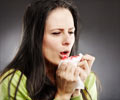Nursing mothers taking codeine should watch their babies for increased sleepiness, FDA has warned. Also tiny tots should not be given cold medicines without specific directions.
The US Food and Drug Administration has called upon nursing mothers taking codeine to look for increased sleepiness or other symptoms of overdose.
Also it has warned against giving children under two years over-the-counter cold or cough medicines.Cough and cold medicines only treat the symptoms of the common cold such as runny nose, congestion, fever, aches, and irritability. They do not cure the common cold. Children get better with time, FDA says.
The advisory on codeine follows the death of a nursing child whose mother was given codeine for pains after birth.
Genetic testing later showed the woman's body converted the codeine to morphine more rapidly and completely than in other, which led to higher-than-expected morphine levels in her breast milk.
While the rapid conversion of codeine to morphine is a rare side effect in some mothers, it can result in high and unsafe levels of the latter drug in the blood and breast milk, FDA said.
Codeine is among the most common drugs taken by new mothers.
Advertisement
It is now recommended that, given the risk, doctors should prescribe nursing mothers the smallest dose of codeine for the shortest period of time.
Advertisement
In children, signs of morphine overdose, beyond increased sleepiness, include difficulty breast-feeding or breathing and limpness.
Nursing mothers may also experience overdose symptoms, such as extreme sleepiness, confusion, shallow breathing or severe constipation.
The FDA has also said it is reviewing the safety and effectiveness of nonprescription cough and cold drug use in children. A panel will discuss the topic in October.
The agency issued a public health advisory Friday stating that "questions have been raised about the safety of these products and whether the benefits justify any potential risks from the use of these products in children, especially children under 2 years of age."
It warns that "some reports of serious adverse events associated with the use of these products appear to be the result of giving too much of these medicines to children."
The FDA stresses the importance of following directions for use noted in the "Drug Facts" box on the product label.
"An over-the-counter cough and cold medicine can be harmful if more than the recommended amount is used, if it is given too often, or if more than one cough and cold medicine containing the same active ingredient are being used," it stresses.
The FDA's public health advisory includes the following advice for parents about using cough and cold products in children:
• Do not use cough and cold products in children under 2 years of age UNLESS given specific directions to do so by a health care provider.
• Do not give children medicine that is packaged and made for adults. Use only products marked for use in babies, infants or children (sometimes called "pediatric" use).
• Cough and cold medicines come in many different strengths. If you are unsure about the right product for your child, ask a health care provider.
• If a child’s condition worsens or does not improve, stop using the product and immediately take the child to a health care provider for evaluation.
The Consumer Healthcare Products Association (CHPA), a trade group representing U.S. makers and distributors of over-the-counter (OTC) medicines and nutritional supplement products, responded, saying, “Millions of Americans safely and effectively use OTC cough and cold medicines every year, both for themselves and for their families. These medicines have been found safe and effective by the U.S. Food and Drug Administration (FDA) and are the same medications families have trusted for decades to help relieve cough and cold symptoms and make their children feel better.
“Parents know they can rely on safe and effective OTC cough and cold remedies when treating their children, but must do so according to label directions. As with all medicines, not following the label can result in harm to children. We know that adverse events can be the result of parents giving too much medicine to their children. OTC cough and cold medicine labels contain detailed information to help parents correctly medicate their children, including an instruction to contact a physician before giving the medication to a child under the age of two.
“We commend FDA on its commitment to ensuring American parents have quality medicines and the information to use them correctly when caring for children. We look forward to working closely with the agency and the healthcare community on this very important issue and at FDA’s October meeting of its expert advisory committee.“
Source-Medindia
GPL/B







